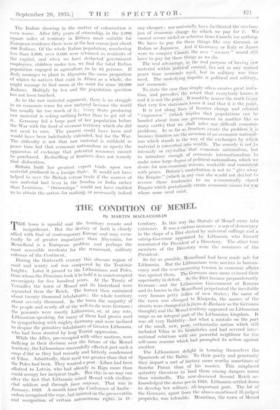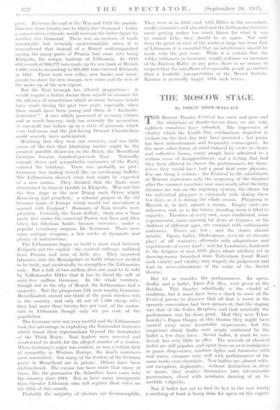THE CONDITION OF MEMEL
By MARTIN
MACLAUGHLIN
THE town is squalid and the territory remote and insignificant. But the destiny of both is closely allied with that of contemporary Europe and may even- tually be of greater importance than Abyssinia, for Memelland is a European prOblem and perhaps the most accessible irredenta for the renaissant, military colossus of the Continent.
During the thirteenth century this obscure region of sand and scanty soil was conquered by the Teutonic knights. Latei it passed to the Lithuanians and Poles, from whom the Prussians took it to hold it in uninterrupted sovereignty for five hundred Years: At the Treaty of Versailles the town of Memel and its hinterland were separated from the Reich. The former then contained about' twenty thousand inhabitants ; the whole territory about seventy thousand. In the town the majority of the people and nearly all of the well-to-do were German ; the peasants were mostly Lithuanian, or, at any rate, of them had grown used Lithuanian-speaking, for' many to syMpathising with mighty Germany and were inclined to despise the primitive inhabitants of Greater Lithuania, who had been stunted by long Tsarist oppression. While the Allies, pre:occupied with other matters, were dallying in their decision over the future of the Memel territory, the Lithuanians successfully effected just such a Coup d'etat as they had recently and bitterly condemned at Vilna. Admittedly, their need was greater than that of the Poles had been. They Wanted a port—LLibau had been allotted to Latvia, who had already in Riga more than Could occupy her incipient trade. But this in no way can alter the fact that Lithuania seized Memel with civilian- clad soldiers and through force majeure. That • was in January, 1928. A month later the Conference of Amba - sadors recognised:the rape, but insisted on the preser viiii and recognition of Certain autonomous rights` - in th territory. In this way the Statute of Memel came into existence. It was a curious measure : a sop of democracy in the shape of a Diet elected by universal suffrage and a . satrap-Governor appointed by Lithuania who himself nominated the President of a Directory. The other few members of the Directory were the nominees of the President. So far as possible, Memelland had been made safe for Lithuania. But the Lithuanians were novices in bureau- cracy and the ever-increasing tension in economic *affairs was against them. The Germans once more evinced their superiority in defeat. So the Diet became preponderantly Germa,n1—and the Lithuanian Government at Kaunas and its bosses in the Memelland perpetrated the'inevitable very human petty follies oifcialite;e,daStattieles ;natliineesnaonf-retinlef the town was changed, ed streets were changed ialacon de Barbarie so the Germans thought) and the Memelterritory appeared on Lithuanian maps 'as an integral part of 'the Lithuanian kingdoin. It was all very Babbitty—but what a mistake on the part, of the small, new, ripoT? enthusiastic nation which still included Vilna in boundaries and had severed inter- national relations with one powerful neighbour for the self-same reasons' which had prompted its action against another. The Lithuanians delight in ,terming themselves the Spaniards of the Baltiel to their gaiety and generosity they impart a sort Of 'fantasy more worthy sometimes of Sancho, Panza than of his Master. This miSplaced qiiixotry threatens' to land them among dangers worse than windmills. The newEdeeeased Second Reich ac- knowledged the status quo in 1928. 'Lithuania settled down to develop her solitary; , all-iniportant port. The lot of the Germans; apart from' the above-mentioned ill-judged pinpricks,' was tolerable.' Meantime, the town of Memel grew. Between the end of the War and 1925 the popular Lion rose from twenty-one to thirty-five thousand ; today. a .conservative estimate would increase the latter figure by another five thousand. There was an increase of trade remarkable but certainly understandable when it is remembered that instead of a Memel undistinguished among the many ports of Prussia had come into being Klaipeda, the unique harbour of Lithuania. In 19241 694 vessels of 266,777 tons made up the sea-trade of Memel; 1,630 'vessels amounting to 622,802 tons entered Klaipeda in 1934. There were new villas; new banks and immi- grants to atone for new stamps, new coins and the rest of the make-Up of the new regime.
But the Nazi triumph has ' altered proportions : it would require a better doctor than myself' to account for the odyssey of neuroticism which so many German minds' have made during the past two years, especially when these minds have been young and those of " Auslands- deutscher." A race which, possessed of so many virtues and so much bravery, took too seriously the accusation of war-guilt has woken up in a state of paranoia which even' Gob:neau and the jest-loving Stewart Chamberlain could scarcely have anticipated.
Realising that they were not outcasts, and too little aware of the fact that blustering tactics might be the greatest possible disservice to the Reich, the Memelland Germans became hundred-per-cent. Nazi. Naturally enough clever and sympathetic emissaries of the Party entered the territory. There was probably no plot ; Germany was finding herself like an awakepiug buffalo. The Lithinusians showed what tact might be expected of a new nation. They decided that the Nazis were determined to foment trouble in Klaipeda. Was not this the first stage in the new Drang each Osten which Rosenberg had preached ; a colonial project. in the old German lands of Europe which would not necessitate -a quarrel with England ! Rumours- of Nazi revolts were plentiful. Certainly the Nazis drilled ; there was a Nazi party first under the convivial Pastor von Suss and then when his bibulous habits became excessive, under popular veterinary surgeon, Dr. Neumann. There were some antique weapons, a few sticks of dynamite and plenty of indiscretions.
The Lithuanians began to build a main road between Klaipeda and the capital—the existent railways radiated from Prussia and were of little use. They imported labourers into the Memelgebiet to build whatever needed to be built, and incidentally to strengthen the Lithuanian vote. But a folk of two million does not need to be told by Volkskanzler Hitler that it has to dread the will of sixty-five million Germans. In the whole territory, though not in the city of Memel, the Lithuanians had a majority. But the prosperous folk were mostly Germans. Memellanders owned one-third of the good wireless sets in the country, and only 45 out of 7,200 cheap sets they had more than twenty-five per cent. of the motor- cars in Lithuania though only six per cent. of the population.
The Germans were not very tactful and the Lithuanians took due advantage in exploiting.othe Nationalist fantasies which found their repercussions beyond the boundaries of the Third Reich. Nazi leaders were arrested and condemned to death for the alleged murder of a traitor. When Germany's anger was evident, as was a certain lack of sympathy in Western Europe, the death sentences were commuted : but many of the leaders of the German party in Memelland are in prison. Others have been disfranchised. The excuse has been made that many of these, like the persuasive Dr. Schreiber, have come into, the country since 1918. But so have many immigrants from Greater Lithuania who will register their votes on the '29th of this month.
Probably the majority of electors are Germanophile,-, They were so in 1982, and, with Hitler in the ascendant, world economics still abysmal and the Lithuanian Govern- ment getting rather too much blame for what it can or cannot help, they should be so .again. Not only from the point of view. of the world at large. but from that of Lithuania it is essential that no interference should be made with the just issue. • While it is certain that the wilder influences in Germany would welcome an invasion of the Eastern Baltic at any price, there is no reason to suspect that the intentions of responsible people go further than a laudable interpretation of the Memel Statute. Kaunas is avowedly happy with such terms..







































 Previous page
Previous page